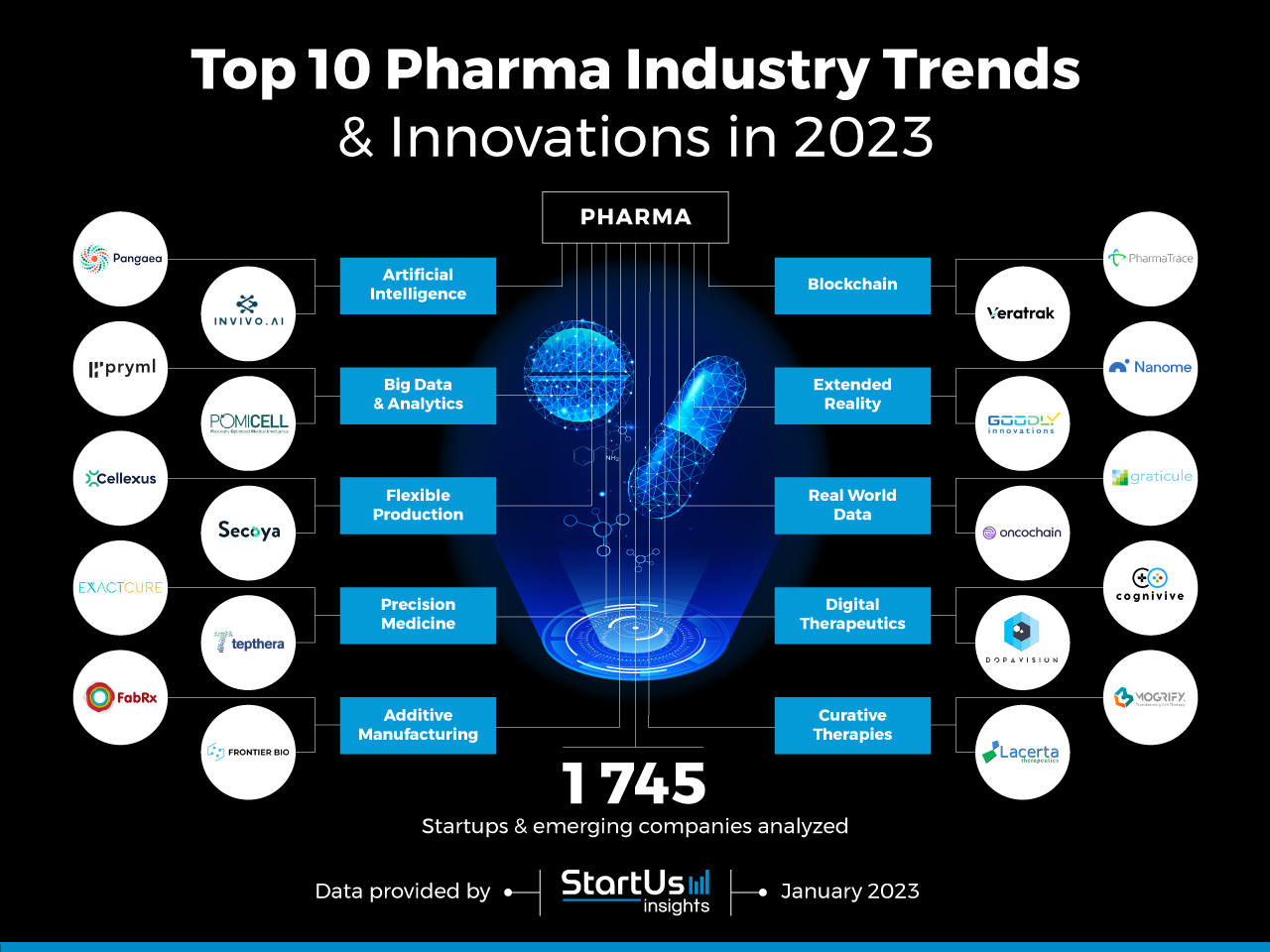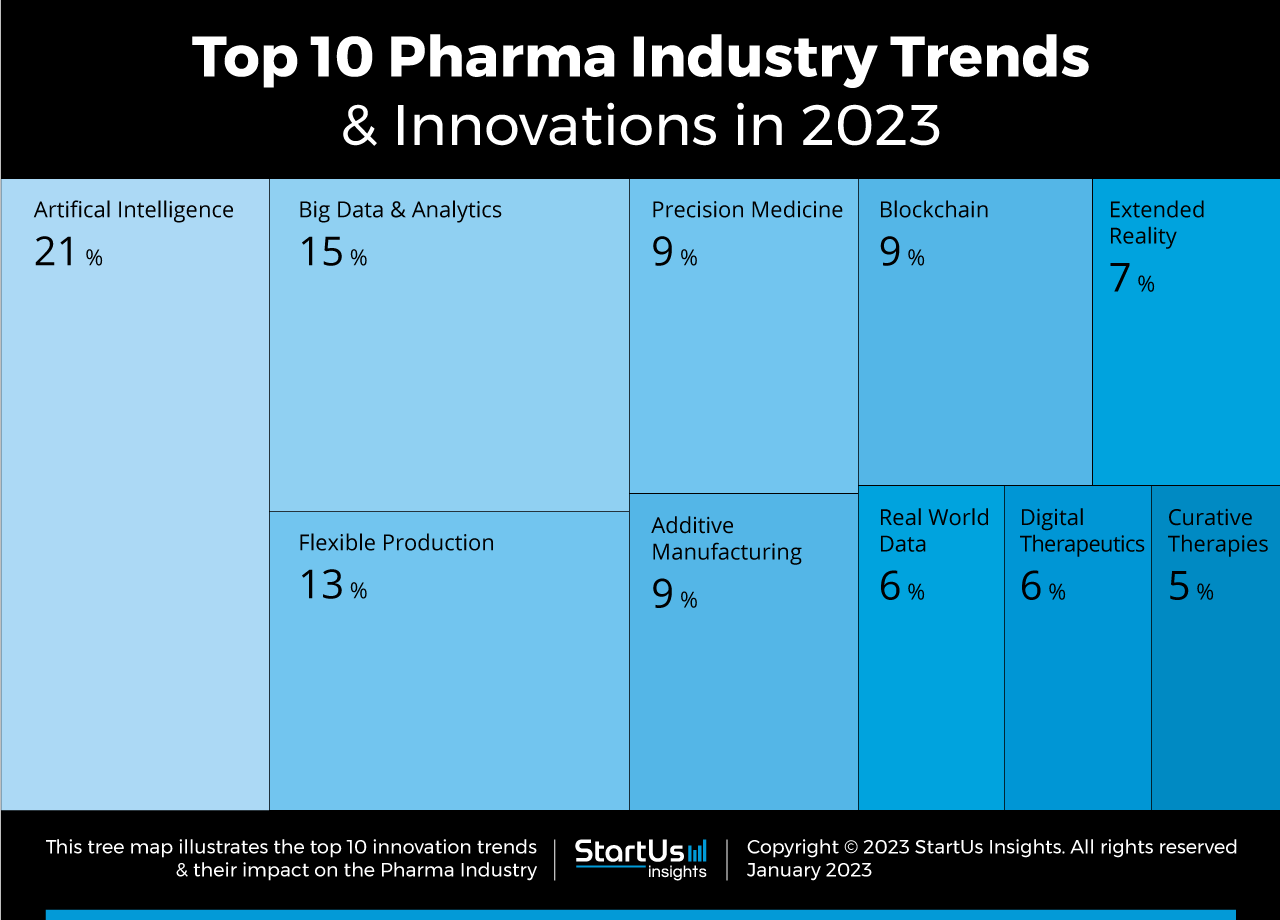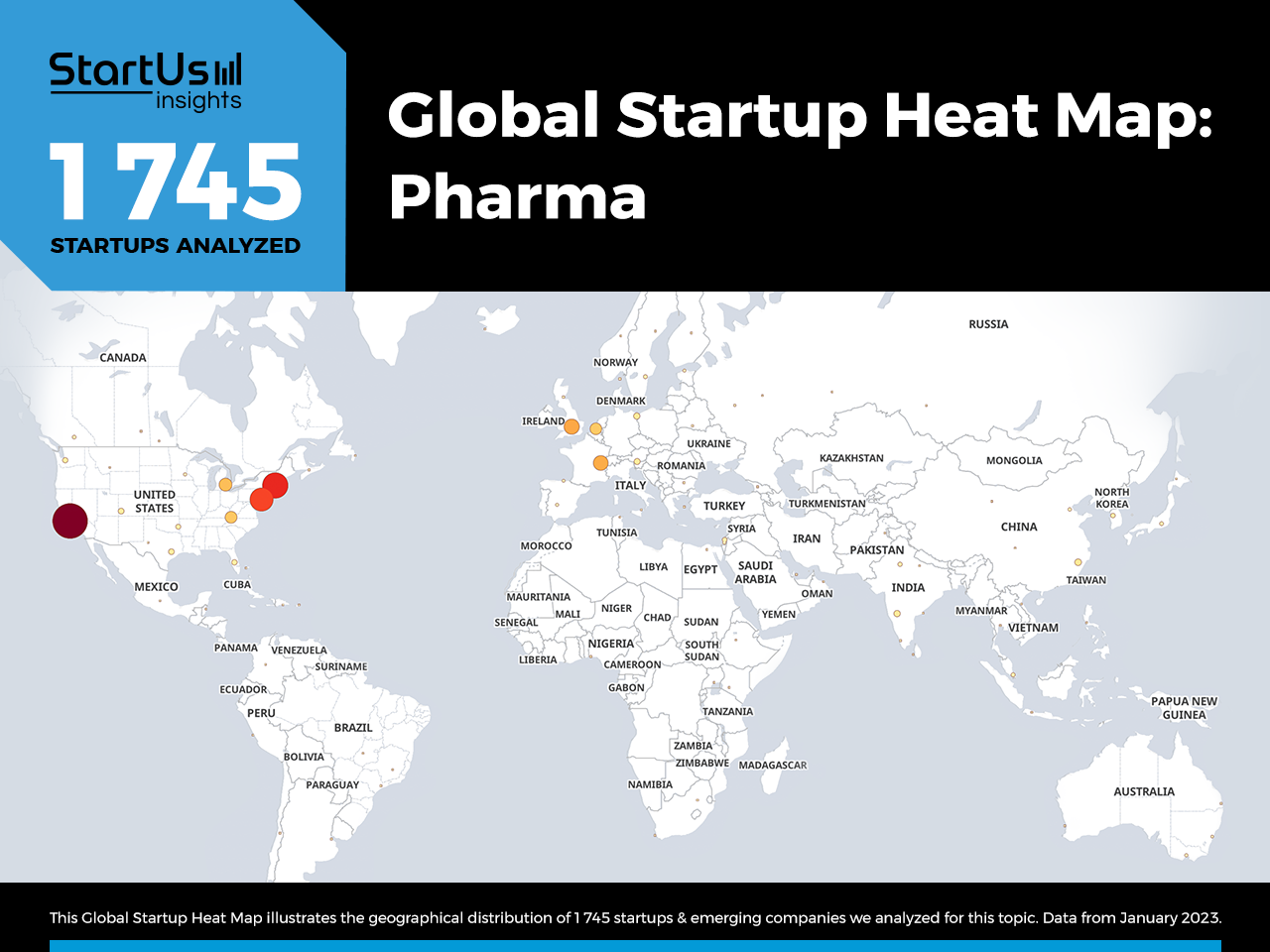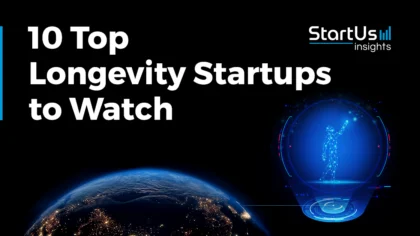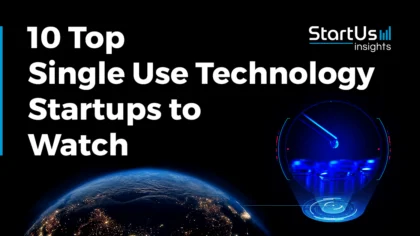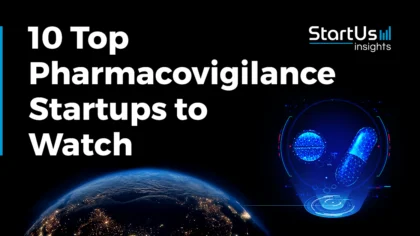Accelerate Productivity in 2025
Reignite Growth Despite the Global Slowdown
The pharmaceutical industry is undergoing a significant transformation, driven by the rapid integration of technologies like artificial intelligence (AI), additive manufacturing, and blockchain. These key pharmaceutical industry trends are catalyzed by substantial investments, the maturation of industry technologies, and the expiration of crucial patents. Enhanced inter-organizational collaboration and a supportive regulatory framework are further accelerating innovation and reshaping the pharmaceutical landscape.
This article was published in October 2020 and updated in January 2024.
Innovation Map outlines the 10 Current Trends in Pharmaceutical Industry & 20 Promising Startups
For this in-depth research on the Top Pharma Industry Trends & Startups, we analyzed a sample of 1745 global startups & scaleups. This data-driven research provides innovation intelligence that helps you improve strategic decision-making by giving you an overview of emerging technologies in the pharma industry. In the Pharma Industry Innovation Map, you get a comprehensive overview of the innovation trends & startups that impact your company.
What are the Top Pharmaceutical Industry Trends (2024)?
- AI in Pharmaceuticals
- Big Data & Analytics
- Flexible Production
- Precision Medicine
- Additive Manufacturing
- Blockchain
- Extended Reality
- Real-World Data (RWD)
- Digital Therapeutics
- Curative Therapies
These insights are derived by working with our Big Data & Artificial Intelligence-powered StartUs Insights Discovery Platform, covering 3 790 000+ startups & scaleups globally. As the world’s largest resource for data on emerging companies, the SaaS platform enables you to identify relevant technologies and industry trends quickly & exhaustively.
Tree Map reveals the Impact of the Top 10 Pharma Industry Trends in 2024
The Tree Map below illustrates the top 10 pharmaceutical trends that will impact companies in 2024. From drug discovery and development to medical imaging and patient engagement, artificial intelligence occupies a prominent position in the industry. Along with big data and analytics, more than a third of pharma startups are working on software solutions for the industry. There is still a lack of access to basic medicines in many regions of the world, prompting demand for flexible pharmaceutical manufacturing.
The use of real-world data to collect accurate patient experiences, blockchain to securely transact and manage patient records, and augmented, virtual, and mixed reality (AR, VR & MR) solutions also find a place in the top 10 trends in the pharmaceutical industry. However, these technology trends in the pharmaceutical industry cover only a small fraction of the breadth of innovation in the industry. Based on your specific criteria, your top trends can look quite different.
Global Startup Heat Map covers 1745 Pharma Startups & Scaleups
The Global Startup Heat Map below highlights the global distribution of the 1745 exemplary startups & scaleups that we analyzed for this research. Created through the StartUs Insights Discovery Platform, the Heat Map reveals that the United States is home to most of these companies while we also observe increased activity in India as well as Europe, particularly in the UK and France.
Below, you get to meet 20 out of these 1700+ promising startups & scaleups as well as the solutions they develop. These 20 startups were hand-picked based on criteria such as founding year, location, funding raised, and more. Depending on your specific needs, your top picks might look entirely different.
Interested to explore all 1700+ pharma startups & scaleups?
10 Key Trends in Pharmaceutical Industry (2024)
1. AI in Pharma
The use of artificial intelligence (AI) is accelerating drug discovery and development processes. Innovative startups are leveraging AI to tackle industry challenges, streamlining manufacturing processes, and devising efficient marketing strategies for post-launch success. In the critical realm of patient selection for clinical trials, AI enhances the precision of eligibility criteria, streamlines patient inclusion, and accelerates cohort identification.
This not only expedites the entire clinical trial process but also reduces associated costs significantly. Furthermore, AI’s predictive analytics are instrumental in identifying potential participants, ensuring a more targeted and effective trial phase, and consequently, a swifter route to market for new drugs. The global AI in drug discovery market is expected to grow at a CAGR of 28.2% from 2024 to 2030, highlighting its increasing impact on the pharmaceutical industry.
Pangaea Data – Patient Cohort Identification
Pangaea Data is a British startup that uses unsupervised AI algorithms to identify patient cohorts for drug discovery, clinical trials, and real-world evidence (RWE) studies. The machine learning-based software scans through electronic health records (EHR) and unstructured doctors’ notes. Pangaea Data’s solution enables clinicians to find the right patients based on phenotypes. The startup also develops a library of AI models for different disease areas.
Valence Discovery – Drug Discovery
Canadian startup Valence Discovery develops novel algorithms for drug discovery. The startup uses different machine learning approaches, such as few-shot learning, reinforcement learning, active learning, and representation learning, to aid the drug discovery process. Its deep learning solution uses small and noisy datasets to predict and optimize potential drug candidates, further eliminating the need for large datasets.
2. Big Data & Analytics
The pharma industry requires high-performance systems to analyze the large volumes of data generated during the drug discovery and development process. Pharmaceutical companies use third parties to share data with collaborators, making data management a crucial area of focus. The advancement in analytical techniques is also turning historical and real-time data available with pharmaceutical companies into valuable assets for predictive, diagnostic, prescriptive, and descriptive analytics.
Moreover, these pharmaceutical analytics techniques are used on almost all types of medical data from patient records, medical imaging, and hospital data, to name a few. The pharmaceutical analytical testing market is expected to reach USD 8.98 billion in 2024 and grow at a CAGR of 8.41% to reach USD 13.43 billion by 2029, highlighting the growing importance of analytics in the industry.
Baixing AI Lab – Medical AI Research Platform
Baixing AI Lab is a US-based startup that creates AI Pharma Bx, a SaaS medical AI research platform. It combines proprietary data sourced from RWD, clinical data, and more with multimodal fusion, machine learning, and natural language processing (NLP).
With this integrated approach, the startup eliminates data silos in pharmaceutical research. AI Pharma Bx thus benefits pharmaceutical companies, doctors, researchers in basic medicine and drug mechanisms, and other aspects of research.
Pomicell – In-Silico Modeling
Israeli startup Pomicell offers software tools for big data analytics in pharmaceutical research and development (R&D). The startup utilizes machine learning techniques to analyze and aid in the development of in-silico models. The startup further builds customized drug development road-maps by augmenting the available data, analysis, and insights through matching and in-silico modeling.
3. Flexible Production
The pharma industry is adapting its manufacturing to meet new market needs, like producing smaller batches for precision medicine. Single-use bioreactors are becoming popular for their efficiency, cutting downtime by simplifying cleaning and validation.
Additionally, new bioreactor technologies and continuous manufacturing are key in biopharmaceutical production. They minimize downtime, use less energy, boost productivity, and reduce waste. These advancements also ensure consistent product quality, comply with strict regulations, and allow quicker market response.
Cellexus – Single-Use Bioreactor
Cellexus is a Scottish startup that makes single-use airlift bioreactor systems. The startup’s patented airlift technology uses bubbles instead of mechanical mixing to move cells and nutrients. The reactor comes with disposable bioreactor bags and an integrated heater.
The startup also offers precise regulation of biochemical parameters such as pH, dissolved oxygen, and temperature. The single-use system is used for a variety of cell cultures and fermentation and has achieved the growth of bacteria, yeast, microalgae, and bacteriophage amplification.
Secoya Technologies – Continuous Manufacturing Optimisation
Belgian startup Secoya Technologies offers novel technologies for production processes by tailoring the continuous manufacturing process equipment down to the ideal scale. Microstructured elements such as microfluidic droplet generators are used for optimizing manufacturing processes. The startup’s solutions find use in intensified chemical synthesis, crystallization, pervaporation, and micro-encapsulation.
4. Precision Medicine
Precision medicine stems from the concept of tailoring treatment to the distinct characteristics of each patient. Progress in omics and data analytics is shedding light on the human body’s drug response mechanisms. This understanding, combined with innovative production techniques like additive manufacturing, is bringing personalized medicine closer to fruition.
Drug exposure models play a crucial role in precision medicine by assessing the pharmacokinetic and pharmacodynamic attributes of drugs. These models aid in determining the optimal drug dosage by considering factors such as age, gender, comorbidities, and other clinical variables. The global precision medicine market size is expected to reach USD 168.3 billion by 2032, growing at a CAGR of 9.1% during 2024-2032.
ExactCure – Drug Exposure Model
ExactCure is a French pharmaceutical technology company that offers a software solution for simulating the effects of drugs in a patient’s body based on personal characteristics. The startup utilizes population pharmacokinetics, as well as scientific literature data, for real-time prediction of efficacy and drug interaction. ExactCure is developing drug-specific exposure models for drugs under investigation for the treatment of COVID-19.
GenomicDAO – Decentralized Science (DeSci) for Precision Medicine
GenomicDAO is a Singaporean decentralized autonomous organization (DAO) that develops an AI-powered DeSci platform for precision medicine. It allows members to contribute to active DAOs and receive proprietary tokens in return.
The startup then recruits participants to join genetic tests and the revenue from the test is shared back to DAO members. Using its drug response study, the startup provides gene-based drug recommendations for patients, advancing precision medicine.
5. Additive Manufacturing
The demand for precision medicine is driving pharmaceutical companies to revolutionize their production techniques. Significant research is dedicated to evolving advanced 3D printers that print tissues or cells. Within the pharmaceutical sector, 3D printing finds utility in the realms of drug formulation, organ fabrication, and regenerative therapy.
Consequently, additive manufacturing enables the crafting of medical formulations tailored to individual age or physiological profiles, as well as the creation of precision dosage pills. Additionally, bioprinters are pivotal in advancing the fields of bioinks, tissue scaffolding, and microfluidics.
FabRx – Printed Pill
FabRx is a UK-based startup that manufactures M3DIMAKER, a 3D printer for personalized pills. M3DIMAKER uses proprietary technology for direct powder extrusion. The single-step printing process uses a single screw extruder for the extrusion of powdered material.
The startup manufactures pills with properties such as sustained or delayed doses, and multidrug combination pills (polypills). The printer also enables small batch production for clinical trials and precise personalized dosage forms for individuals.
Frontier Bio – Tissue Bioprinter
The US-based startup Frontier Bio offers FLUX-1, a 3D bioprinter for making human tissues. The startup prints tissues as an effective way to test new pharmaceuticals. Frontier Bio addresses the limitations in making tissues have desirable structures and features with a good cell survival rate. FLUX-1 employs the electro-hydrodynamic printing (EHDP) technique to deliver tissues with micro and nano-scale features, as well as higher cell survival rates.

6. Blockchain
Blockchain technology is crucial at every stage of drug production and distribution in the pharmaceutical industry. Stakeholders typically guard their data closely due to its sensitive nature. Furthermore, blockchain is being examined as a reliable tool to tackle the use of counterfeit medicines and substandard drugs, which compromise the pharmaceutical supply chain and result in many patient deaths each year. The shift towards digital transactions makes blockchain a viable solution for improving the tracking and safety of the pharmaceutical transaction landscape.
PharmaTrace – Smart Contracts
PharmaTrace, a German startup offers a blockchain-based ecosystem to secure data and deploy smart contracts in the pharmaceutical industry. The ecosystem provides a secure system for sharing crucial and sensitive information between stakeholders in the pharmaceutical marketplace. PharmaTrace leverages smart contracts implemented in Hyperledger Fabric to address this trust deficit. Moreover, the network provides precise control and security over the information being shared.
Veratrak – Pharma Supply Chain
Veratrak is a UK-based startup offering a blockchain-based document collaboration and workflow management platform for the pharmaceutical supply chain. The platform enables secure document sharing across supply chain partners with immutable audit logs. Good automated manufacturing practice 5 (GAMP 5)-compliant cloud-based software further lets stakeholders, within and outside organizations, collaborate at various stages of the pharma supply chain.
7. Extended Reality (XR)
Mixed reality (MR), virtual reality (VR), and augmented reality (AR) are transforming visualizations in unparalleled ways. Pharma startups are investigating the potential of extended reality technologies in the realms of pharmaceutical research and manufacturing.
These extended reality tools enable data-rich and meaningful interactions among research teams in real time, regardless of geographical location. Startups are bringing human augmentation in the pharmaceutical sector to life through innovative extended reality wearables and devices.
Nanome – VR Collaboration Tool
Nanome, a US-based startup, offers VR collaboration tools for atomic, molecular, and protein visualization. The VR-based molecular visualization tool by Nanome imports molecular data from public databases or custom inputs. It lets researchers design proteins, iterate 3D structures, and also work in a virtual workspace with global team members.
Goodly Innovations – AR Suite
German startup Goodly Innovations develops OptiworX, an AR suite for pharma and biopharma manufacturing. The solution enables technicians and line operators to increase their productivity and efficiency by prompting various tasks in real-time, in an AR environment.
The startup’s modular design allows for both standalone and connected systems, enabling two-way data flow. Additionally, this suite supports all shop floor processes like manufacturing, filling, primary packaging, and secondary packaging.
8. Real-World Data
Real-world data (RWD) and real-world evidence (RWE) are reshaping innovation in the pharmaceutical sector. RWD encompasses information about patient health, treatments, and routine health reports. Given its research-driven essence, the pharmaceutical industry must ensure the reliability and significance of the data it utilizes. The accessibility of real-world data, facilitated by the Internet of Things (IoT), sensors, and wearable technology, is restructuring the operational dynamics of the pharmaceutical industry.
Graticule – Unstructured Patient Data
The US-based startup Graticule creates structured data sets from unstructured RWD sources. The startup offers data subscriptions and on-demand data collaborations to pharma clients for uncovering value in RWD. Graticule makes use of clinical notes, free text, and images, as well as non-clinical data for data completeness.
OncoChain – Oncological Data
Romanian startup OncoChain offers a research platform based on a de-identified real-world oncological patient database. The startup’s solution enables early detection and timely intervention for cancer detection, treatment, and cure. The OncoChain Analytics tool also provides real-world evidence insights for regulatory decision-making, clinical trial design, and multi-center studies.
9. Digital Therapeutics
Digital therapeutics deliver evidence-based therapeutic interventions using software, providing non-drug, technology-centric solutions to prevent, manage, or treat a wide array of physical, mental, and behavioral conditions. These interventions function independently or in conjunction with medications, devices, or other therapies. Digital therapeutics empower individuals by granting them enhanced control over their health and treatment outcomes.
MINDCURE Health – Psychedelic Therapy
MINDCURE Health is a Canadian startup that offers iSTRYM, a software application to deliver data-driven support for psychedelic therapies. It collects real-world data before, during, and after therapy sessions and then applies AI to analyze the data. The application also provides clinicians with data-proofed protocols and integration plans as well as real-time plans for personalized plans. This, in turn, improves clinical outcomes and patient convenience.
Dopavision – Eye Treatment
German startup Dopavision is making a smartphone-based digital therapeutic for myopia. The startup’s solution aims to slow down the progression of myopia in the young population, especially children. The solution achieves the activation of dopamine, a neurotransmitter that plays an important role in eye growth regulation. Dopavision is currently undertaking pre-clinical trials of the digital therapeutic.
10. Curative Therapies
A fundamental shift is occurring in the approach to treating illnesses, moving from disease management to achieving complete cures. Curative treatments, including cell and gene therapies, are transforming the treatment landscape for chronic and complex conditions by negating the necessity for prolonged therapy.
Gene therapy involves the introduction of genetic material into cells to counteract defective genes or to produce a beneficial protein. Viruses that have been genetically modified typically serve as the primary vectors in gene therapy applications.
Mogrify – Cell Therapy
Mogrify is a British startup that develops a proprietary direct cellular conversion platform to transmogrify any mature human cells. The platform technology identifies the transcription factors or small molecules required to convert any mature cell into any other mature cell type by analyzing sequencing data and regulatory networks. Mogrify develops novel cell therapies for musculoskeletal, auto-immune, and cancer immunotherapy, as well as ocular and respiratory diseases.
Lacerta Therapeutics – Gene Therapy
The US-based Lacerta Therapeutics is a clinical-stage gene therapy startup working on cures for the central nervous system and lysosomal storage diseases. The startup’s proprietary adeno-associated virus (AAV) vector technology platform develops novel AAV vectors with improved transduction, tissue- or cell subtype-selectivity, and immune escape profiles. Lacerta further offers novel capsid variants and a scalable vector manufacturing platform with limited production components.
Discover all Pharma Technologies & Startups
The COVID-19 pandemic has forced companies to reevaluate various facets of their operations, including manufacturing and supply chains, a trend equally pertinent for pharmaceutical firms. The crisis underscored the necessity to enhance the rapidity and precision in the discovery, mass production, and distribution of new drugs, treatment methodologies, and vaccines. Moreover, entities at the nexus of life sciences research, biotechnology, and pharmaceuticals are unveiling novel cellular and molecular properties, paving the way for groundbreaking industry solutions.
The trends and startup innovations in the pharmaceutical sector highlighted in this report represent just a fraction of the developments uncovered through our comprehensive research. Emerging technologies such as low-volume production, nanotechnology, and mRNA vaccine technologies are set to redefine the industry landscape. Proactively identifying and integrating these emerging opportunities and technologies into your business strategy is crucial for securing a competitive edge. Contact us to seamlessly and thoroughly explore relevant technologies and startups that align with your objectives.
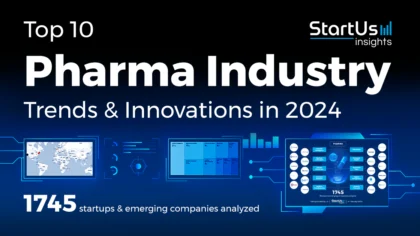
 WATCH THE VIDEO VERSION
WATCH THE VIDEO VERSION 